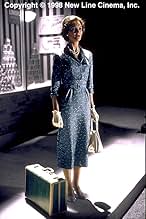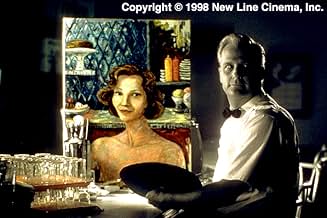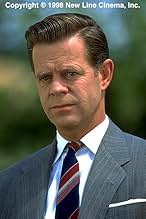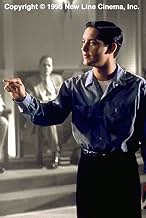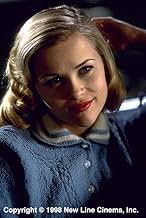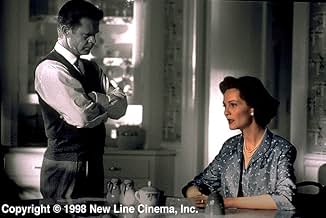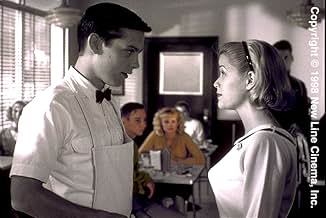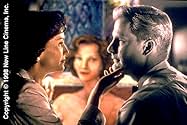Dois irmãos adolescentes da década de 1990 se encontram em um sitcom de 1950, onde sua influência começa a mudar profundamente esse mundo.Dois irmãos adolescentes da década de 1990 se encontram em um sitcom de 1950, onde sua influência começa a mudar profundamente esse mundo.Dois irmãos adolescentes da década de 1990 se encontram em um sitcom de 1950, onde sua influência começa a mudar profundamente esse mundo.
- Direção
- Roteirista
- Artistas
- Indicado a 3 Oscars
- 18 vitórias e 45 indicações no total
Enredo
Você sabia?
- CuriosidadesAt one point, when Jennifer tries to use a bathroom there aren't any toilets. This is a clever reference to an FCC ruling during the 1950's, which stated that toilets (or any reference to their use, such as the sound of flushing) could not be presented on television. While this continued on broadcast television well in to the late seventies, the barrier in movies fell in 1960 (two years after the Pleasantville scenario) when Alfred Hitchcock persuaded the film censors to allow the flushing of a toilet in Psicose (1960) because it was integral to the iconic shower scene.
- Erros de gravaçãoVarious inconsistencies and plot holes (stopped clocks, phantom opposing basketball teams) with the real world are consistent with Pleasantville being a TV world, and hence consistent with the movie.
- Cenas durante ou pós-créditosThe New Line logo plays in complete silence.
- ConexõesFeatured in Fiona Apple: Across the Universe (1998)
- Trilhas sonorasAcross the Universe
Written by John Lennon and Paul McCartney
Performed by Fiona Apple
Produced by Jon Brion
Courtesy of Clean Slate/The WORK Group
Avaliação em destaque
I knew what this film would be about before I rented it, but I'm stunned that it would be THIS good. Nothing against "Saving Private Ryan" or "Shakespeare in Love", but this film should have won Best Picture in 1998 and it was a shame that it wasn't nominated. It's an even bigger injustice that it did not get a nomination for best screenplay or cinematography.
In the hands of another writer, this movie could have been made as just a parody of 1950's sitcoms like "Leave It To Beaver" or "Ozzie and Harriet." But this film isn't about how clichéd those series look decades later. It's about the false nostalgia for a past that never existed. We survived the past and we know that everything turned out all right. Because of this, we selectively choose our memories and weed out the unpleasant ones. That's why the past is sometimes seen as "the good ol' days." Pleasantville does not represent how the 50's actually were but rather an idealization of what people THINK the 50's were---no one had sex, everyone got along swell, and life was fairly easy. Nothing could be further from the truth, and there are many film from that era which show how real people (even in suburbia) actually lived. This film argues that free will and choice is ESSENTIAL to life and that we should embrace freedom instead of fearing it. It isn't just about making out, but having the OPTION to make out.
Another reviewer claimed that this film was an attack on the 50's, but David and Jennifer could very easily have been dumped in the world of "The Brady Bunch", "Gilligan's Island" , or "Batman." But setting "Pleasantville" in a 1950's sitcom allows for the brilliant metaphor of black and white versus color. Black and white photography is a stylized depiction of the universe, but unless you're color blind it's not the way you actually see the universe. When we first see Pleasantville's citizens, all of them are cardboard cut-outs of stereotypes. As they begin to open up and become real people, color seeps into their world. The catalyst seems to be the willingness to experience new sensations and become vulnerable. Jennifer has slept with lot of guys when she was in the normal world, so sex does not change HER into a color character. On the other hand, when she actually finishes a book (without pictures) for the first time in her life, THEN she becomes colorized. Similarly, David does not bloom into color until he breaks out of his aloofness and defends his "mother." Compare the way he ignores his real mother at the beginning of the film to how he consoles and comforts her at the end to see how much David has changed.
I could go on and on, but I think you get the idea. There are a lot of films out there that are very entertaining and/or very moving--like "Raiders of the Lost Ark" or "Titanic." Movies like "Pleasantville" which challenge the audience and force them to think are very rare, and should be treasured by the discerning filmgoer.
In the hands of another writer, this movie could have been made as just a parody of 1950's sitcoms like "Leave It To Beaver" or "Ozzie and Harriet." But this film isn't about how clichéd those series look decades later. It's about the false nostalgia for a past that never existed. We survived the past and we know that everything turned out all right. Because of this, we selectively choose our memories and weed out the unpleasant ones. That's why the past is sometimes seen as "the good ol' days." Pleasantville does not represent how the 50's actually were but rather an idealization of what people THINK the 50's were---no one had sex, everyone got along swell, and life was fairly easy. Nothing could be further from the truth, and there are many film from that era which show how real people (even in suburbia) actually lived. This film argues that free will and choice is ESSENTIAL to life and that we should embrace freedom instead of fearing it. It isn't just about making out, but having the OPTION to make out.
Another reviewer claimed that this film was an attack on the 50's, but David and Jennifer could very easily have been dumped in the world of "The Brady Bunch", "Gilligan's Island" , or "Batman." But setting "Pleasantville" in a 1950's sitcom allows for the brilliant metaphor of black and white versus color. Black and white photography is a stylized depiction of the universe, but unless you're color blind it's not the way you actually see the universe. When we first see Pleasantville's citizens, all of them are cardboard cut-outs of stereotypes. As they begin to open up and become real people, color seeps into their world. The catalyst seems to be the willingness to experience new sensations and become vulnerable. Jennifer has slept with lot of guys when she was in the normal world, so sex does not change HER into a color character. On the other hand, when she actually finishes a book (without pictures) for the first time in her life, THEN she becomes colorized. Similarly, David does not bloom into color until he breaks out of his aloofness and defends his "mother." Compare the way he ignores his real mother at the beginning of the film to how he consoles and comforts her at the end to see how much David has changed.
I could go on and on, but I think you get the idea. There are a lot of films out there that are very entertaining and/or very moving--like "Raiders of the Lost Ark" or "Titanic." Movies like "Pleasantville" which challenge the audience and force them to think are very rare, and should be treasured by the discerning filmgoer.
- Eddie C.
- 7 de abr. de 2000
- Link permanente
Principais escolhas
Faça login para avaliar e ver a lista de recomendações personalizadas
Detalhes
- Data de lançamento
- País de origem
- Idioma
- Também conhecido como
- Amor a colores
- Locações de filme
- Petaluma, Califórnia, EUA(Scenes filmed at Petaluma Blvd and Western Ave.)
- Empresas de produção
- Consulte mais créditos da empresa na IMDbPro
Bilheteria
- Orçamento
- US$ 60.000.000 (estimativa)
- Faturamento bruto nos EUA e Canadá
- US$ 40.584.421
- Fim de semana de estreia nos EUA e Canadá
- US$ 8.855.063
- 25 de out. de 1998
- Faturamento bruto mundial
- US$ 49.805.462
- Tempo de duração2 horas 4 minutos
- Cor
- Mixagem de som
- Proporção
- 1.85 : 1
Contribua para esta página
Sugerir uma alteração ou adicionar conteúdo ausente

Principal brecha
By what name was A Vida em Preto e Branco (1998) officially released in India in Hindi?
Responda


